- Home
- »
- Specialty Polymers
- »
-
Textile Chemicals Market Size, Share, Industry Report, 2033GVR Report cover
![Textile Chemicals Market Size, Share & Trends Report]()
Textile Chemicals Market (2025 - 2033) Size, Share & Trends Analysis Report By Process (Pre Treatment, Coating, Treatment Of Finished Products), By Product (Coating & Sizing Chemicals, Colorants & Auxiliaries), By Application, By Region, And Segment Forecasts
- Report ID: 978-1-68038-108-5
- Number of Report Pages: 80
- Format: PDF
- Historical Range: 2018 - 2023
- Forecast Period: 2025 - 2033
- Industry: Specialty & Chemicals
- Report Summary
- Table of Contents
- Interactive Charts
- Methodology
- Download FREE Sample
-
Download Sample Report
Textile Chemicals Market Summary
The global textile chemicals market size was estimated at USD 27,293.7 million in 2024 and is projected to reach USD 40,429.0 million by 2033, growing at a CAGR of 4.4% from 2025 to 2033. The demand for textile chemicals is increasing rapidly due to the booming clothing and apparel industry, driven by the rising global population, urbanization, and higher disposable incomes.
Key Market Trends & Insights
- Asia Pacific dominated the textile chemicals market, accounting for a 57.6% revenue share in 2024.
- The China textile chemicals industry dominated the APAC region with a revenue share of 66.6% in 2024.
- By process, the coating process dominated the market with a 71.4% revenue share in 2024.
- By product, the finishing agents segment is anticipated to register the fastest CAGR of 4.9% from 2025 to 2033.
Market Size & Forecast
- 2024 Market Size: USD 27,293.7 Million
- 2033 Projected Market Size: USD 40,429.0 Million
- CAGR (2025-2033): 4.4%
- Asia Pacific: Largest market in 2024
The textile chemicals industry’s growth is driven by innovations in manufacturing, including digital printing, nanotechnology, and smart textiles, which require advanced chemicals to enhance performance and functionality. Major textile-producing countries such as China, India, and Bangladesh are boosting production with supportive policies and cost advantages. For example, in 2024, the Government of India allocated over INR 1,000 crore to strengthen the textile sector, including INR 600 crore for the Cotton Corporation of India, reflecting strong government backing.However, strict environmental regulations and sustainability standards are challenging the industry, as they restrict the use of certain chemicals and increase compliance costs. According to the UN Environment Programme, the textile industry remains highly resource-intensive and contributes significantly to pollution, prompting a shift toward greener alternatives.
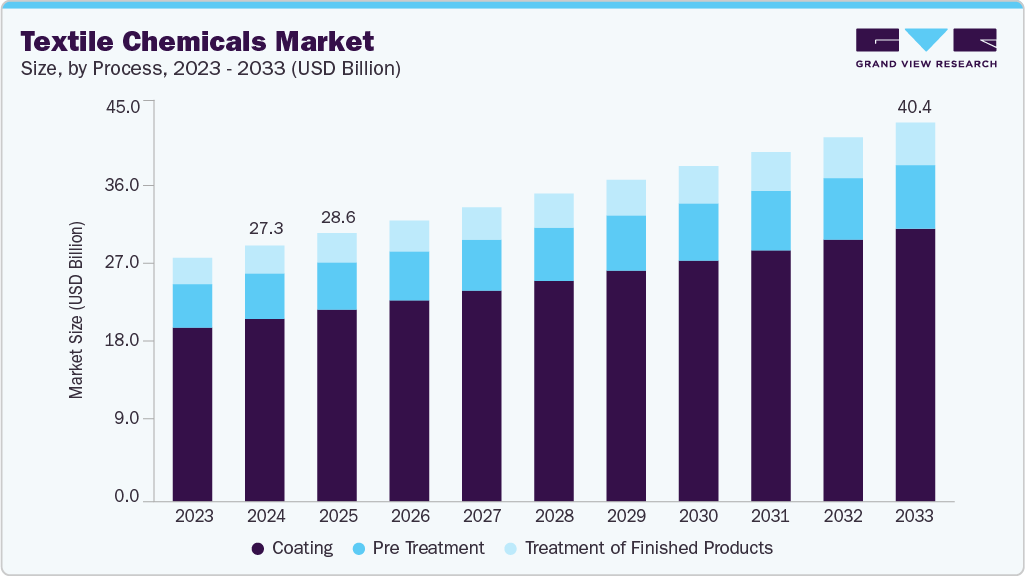
Emerging trends such as sustainable, biodegradable, and non-toxic chemical formulations are shaping market growth. The rising demand for smart textiles, functional fabrics, and high-performance materials in sectors like healthcare, automotive, and construction is further propelling innovation in textile chemicals.
Market Concentration & Characteristics
The textile chemicals market is moderately fragmented, with the presence of several global and regional players competing through innovation, product differentiation, and sustainability initiatives. Leading companies focus on developing eco-friendly and high-performance formulations to comply with tightening environmental regulations and changing consumer preferences. Strategic partnerships, acquisitions, and capacity expansions are common as manufacturers aim to strengthen their supply chain integration and expand their product portfolios across diverse textile applications such as apparel, home furnishings, and technical textiles.
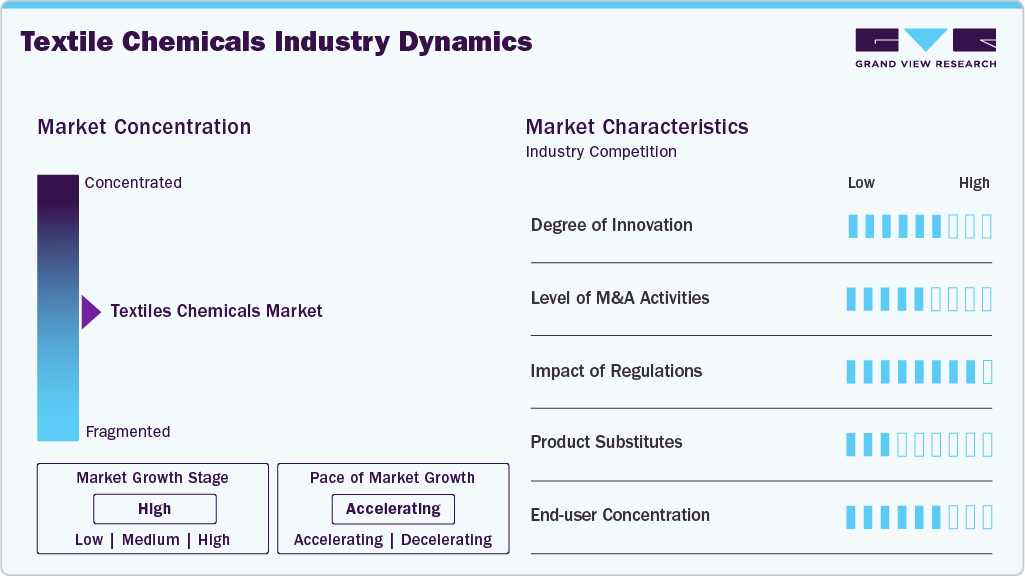
A growing emphasis on sustainable chemistry and performance-driven products characterizes the market. Manufacturers are increasingly investing in R&D to develop chemicals that improve fabric quality, durability, and functionality while minimizing environmental impact. Additionally, demand patterns are shifting toward multifunctional and smart textiles, encouraging suppliers to offer tailored solutions. The integration of digital textile printing and automation across production facilities is also redefining product requirements, creating opportunities for advanced and customized chemical formulations.
Process Insights
The coating process segment held the dominant position in the textile chemicals industry, accounting for around 71.4% of the revenue share in 2024. This process is widely used as it imparts specialized functional properties to textiles that are difficult to achieve through other methods. Coatings can enhance textiles with features such as antimicrobial protection or electrical conductivity, making them suitable for applications like smart textiles. Moreover, the coating process allows high levels of customization to meet specific end-user requirements, while continuous innovations in coating technologies are further expanding the functional and performance capabilities of textile products.
The protection segment under the coating category is expected to register a robust CAGR of 4.9% during the review period, driven by the growing demand for textiles with enhanced resistance to water, UV radiation, fire, and microbial growth. These protective coatings are widely used across sectors such as outdoor apparel, military textiles, and industrial fabrics. Increasing focus on safety, durability, and performance in end-use applications continues to strengthen the demand for protective textile coatings.
The treatment of finished products segment is expected to grow at the fastest CAGR of 4.8% during the forecast period. This segment’s growth is driven by the rising demand for high-quality, durable, and value-added fabrics that meet evolving consumer expectations. Post-finishing treatments enhance textile properties such as softness, wrinkle resistance, color fastness, and water repellency, improving both performance and aesthetics. Additionally, the increasing adoption of sustainable and eco-friendly finishing chemicals is fueling segment expansion, as manufacturers seek to reduce environmental impact while maintaining fabric quality. Continuous innovations in advanced treatment formulations and smart textile finishes are further accelerating the growth of this segment.
Product Insights
The coating & sizing chemicals segment dominated the textile chemicals market, accounting for a revenue share of 50.7% in 2024. Growing consumer demand for high-performance textiles with features like stain resistance, wrinkle-free properties, and enhanced comfort is driving this segment. These chemicals not only enable manufacturers to achieve desired fabric characteristics but also improve physical properties such as strength, durability, abrasion resistance, and water repellency, making textiles suitable for a wide range of applications, from fashion apparel to industrial fabrics.
The finishing agents products segment is the fastest-growing segment with a CAGR of 4.9% during the forecast period, driven by increasing demand for textiles with enhanced appearance, texture, and functionality. These agents improve properties such as softness, smoothness, wrinkle resistance, and color retention, catering to both fashion and technical textile applications while supporting sustainable and high-performance fabric trends.
Application Insights
The apparel segment dominated the textile chemicals industry with a revenue share of 44.8% in 2024. Apparel production represents a major share of the textile industry in both volume and value, necessitating a wide range of chemicals for processes like dyeing, finishing, and sizing. Various fabric types-natural, synthetic, and blended-require specialized chemical treatments to achieve key properties such as color fastness, softness, water resistance, and durability, driving the demand for textile chemicals.
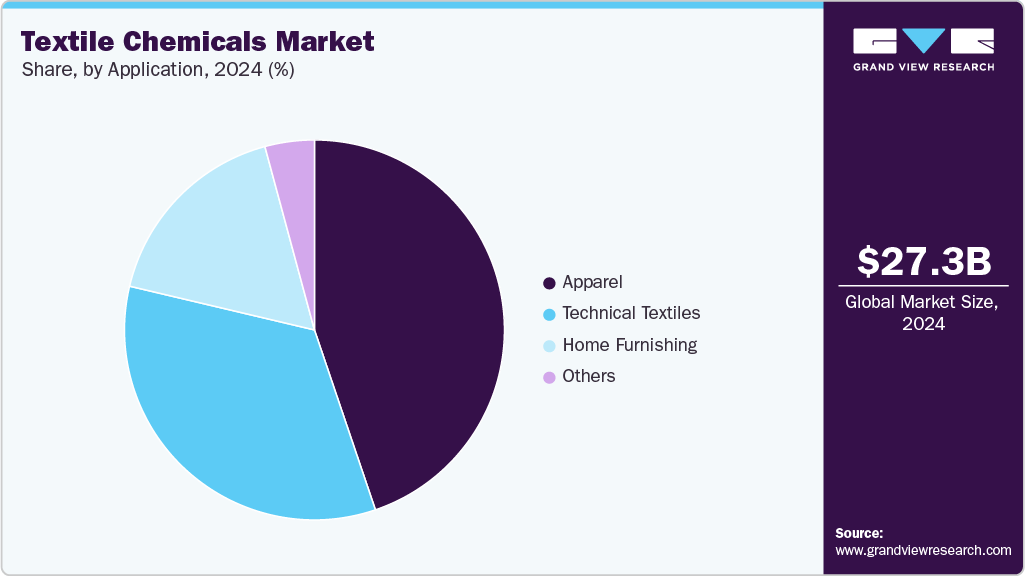
The home furnishing segment registered a steady CAGR of 3.9% during the forecast period. The growth of the segment is driven by the rising consumer demand for durable, easy-care, and aesthetically appealing fabrics for curtains, upholstery, and bedding. Innovative chemical treatments enhance stain resistance, texture, and longevity, while also supporting sustainable and eco-friendly home textile solutions, fueling growth in this segment.
Regional Insights
North America is recognized for its advanced manufacturing capabilities and strict quality standards. Textile producers in the region rely on a wide range of chemicals for dyeing, finishing, coating, and treating fabrics to meet high-quality and regulatory requirements. The growing demand for technical textiles across sectors such as automotive, aerospace, healthcare, and industrial applications is driving the need for specialized chemical treatments that enhance durability, flame resistance, and antimicrobial properties.
U.S. Textile Chemicals Market Trends
The U.S. textile chemicals industry is dynamic and highly developed, supported by a sophisticated manufacturing sector covering apparel, home furnishings, technical, and industrial textiles. Textile chemicals are essential for improving performance, aesthetics, and functionality, with applications in dyeing, finishing, coating, and treatment processes. Key trends include the use of chemicals that provide water repellency, color fastness, flame resistance, and antimicrobial properties, reflecting the growing emphasis on high-performance, durable, and multifunctional textiles.
Asia Pacific Textile Chemicals Market Trends
Asia Pacificdominated the textile chemicals market, accounting for a 57.6% revenue share in 2024. Key textile manufacturing hubs such as China, India, Bangladesh, and Vietnam benefit from low production costs, abundant raw materials, and a large labor pool, making the region a global center for textile and apparel production. The high volume of manufacturing drives significant demand for textile chemicals used in dyeing, finishing, and other treatments to ensure product quality and regulatory compliance.
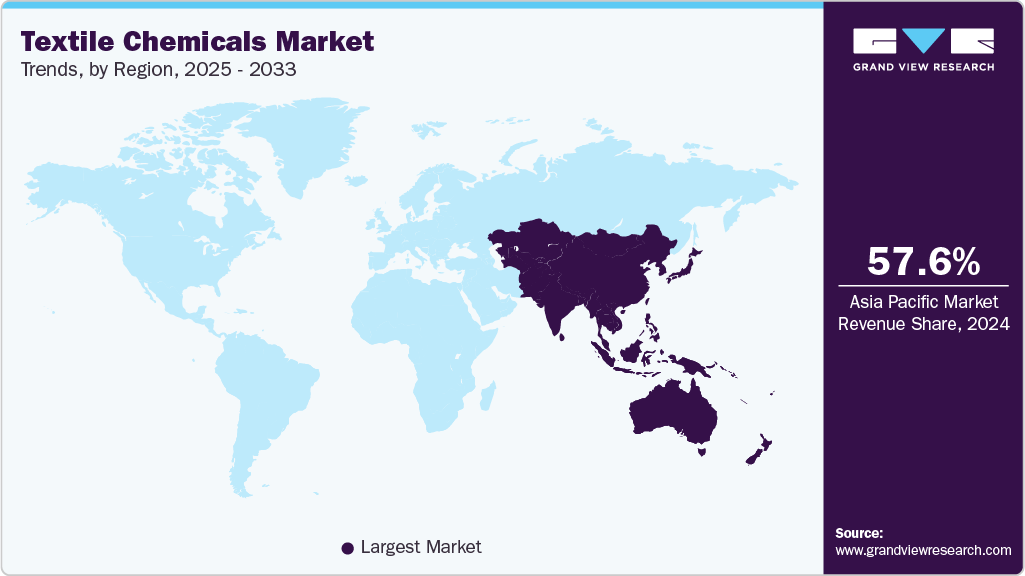
The China textile chemicals industry dominated with a revenue share of 66.6% in 2024. China, as the world’s largest textile producer and exporter, contributes substantially to global textile chemical demand. Its extensive industry, covering everything from raw material processing to finished garments, relies heavily on chemicals for dyeing, printing, finishing, and functional treatments to meet both domestic and international standards.
Europe Textile Chemicals Market Trends
The Europe textile chemicals industry is well-established, backed by a long history of textile manufacturing and chemical innovation. The region emphasizes research and development to create advanced chemicals that improve fabric performance, durability, and multifunctionality. Innovations in dyeing technologies, nanotechnology applications, and sustainable chemical solutions are key drivers of market growth, reflecting Europe’s focus on efficiency, quality, and environmental compliance.
The Germany textile chemicals market is expected to grow over the forecast period. Germany, in particular, stands out for its strong R&D focus across industrial sectors, including textiles and chemicals. German manufacturers lead in developing high-performance and eco-friendly textile chemicals, often pioneering new technologies and processes that set industry benchmarks. The country’s commitment to sustainability, regulatory adherence, and technological advancement continues to strengthen its position as a global leader in textile chemical innovation.
Latin America Textile Chemicals Market Trends
The textile chemicals industry in Latin America is witnessing steady growth, driven by rising domestic demand and expanding export opportunities. Key textile-producing countries such as Brazil, Mexico, and Colombia rely on a wide range of chemicals for dyeing, printing, finishing, and treating fabrics to meet both quality standards and evolving consumer preferences.
Middle East & Africa Textile Chemicals Market Trends
The textile chemicals industry in Middle East & Africa (MEA) is growing as several countries invest in industrial development and infrastructure to strengthen their textile manufacturing capabilities. Initiatives such as the establishment of textile parks and industrial zones are boosting demand for chemicals used in dyeing, finishing, and printing. For example, in May 2024, Kenya launched the Nairobi Gate Industrial Park (NGIP), a 100,000-square-meter facility dedicated to textile and apparel manufacturing and warehousing, aimed at supporting the rapid growth of the country’s cotton, textile, and apparel sectors while attracting foreign investment for large-scale projects.
Key Textile Chemicals Company Insights
Some of the key players operating in the global textile chemicals market include Kiri Industries Ltd., AB Enzymes, Dow, BASF SE, The Lubrizol Corporation, Kemira Oyj, and Evonik Industries AG, among others.
-
AB Enzymes is a biotechnology company specializing in the development and production of enzyme preparations for diverse applications, including baking, fruit juice processing, grain processing, animal feed, paper, textiles, and laundry.
-
Evonik Industries AG is a global specialty chemicals manufacturer with four business segments: Specialty Additives, Nutrition & Care, Smart Materials, and Performance Materials. Through its Performance Materials segment, Evonik supplies performance intermediates such as large-volume additives, along with functional solutions including polymer additives, potassium derivatives, cyanuric chloride, alkyl chlorides, and alkoxides.
-
BASF SE operates across six business segments: chemicals, industrial solutions, materials, surface technologies, nutrition & care, and agricultural solutions. Within its chemical segment, BASF offers intermediates, monomers, petrochemicals, and catalysts. The company also provides non-halogenated flame-retardants for various industries, including textiles.
Key Textile Chemicals Companies:
The following are the leading companies in the textile chemicals market. These companies collectively hold the largest market share and dictate industry trends.
- AB Enzymes
- Archroma
- BASF SE
- BioTex Malaysia
- Dow
- Ethox Chemicals, LLC
- Evonik Industries AG.
- Fibro Chem, LLC
- German Chemicals Ltd.
- Govi N.V.
- Huntsman International LLC
- Kemira Oyj
- Kiri Industries Ltd.
- LANXESS
- OMNOVA Solutions Inc.
- Omya United Chemicals
- Organic Dyes and Pigments
- Resil Chemicals Pvt. Ltd.
- Solvay S.A
- The Lubrizol Corporation
Recent Developments
-
In January 2024, Devan Chemicals, a provider of sustainable textile finishes, is excited to announce its upcoming participation in Heimtextil 2024. Devan invites attendees to visit their booth in Hall 11.0, booth A21, to experience firsthand the latest sustainable textile finishes they have developed.
-
In April 2024, BASF SE announced its portfolio of polyamides for the textile industry. The company’s sustainable polyamide PA6 and PA6.6 product range has been certified under the Recycled Claim Standard (RCS) for textile applications. This certification allows BASF SE to market textiles produced using recycled raw materials.
-
In May 2023, Dystar announced its eco-advanced indigo dyeing, which aims to reduce energy consumption by up to 30% and water usage by up to 90% during the production process.
Textile Chemicals Market Report Scope
Report Attribute
Details
Market size value in 2025
USD 28,621.1 million
Revenue forecast in 2033
USD 40,429.0 million
Growth rate
CAGR of 4.4% from 2025 to 2033
Base year for estimation
2024
Historical data
2018 - 2023
Forecast period
2025 - 2033
Quantitative units
Volume in kilotons, revenue in USD million/billion, and CAGR from 2025 to 2033
Report coverage
Revenue forecast, volume forecast, competitive landscape, growth factors, and trends
Segments covered
Process, product, application, region
Regional scope
North America; Europe; Asia Pacific; Latin America; Middle East & Africa
Country scope
U.S.; Canada; Mexico; Germany; Turkey; Italy; UK; France; Russia; Spain; Poland; China; India; Japan; South Korea; Vietnam; Indonesia; Saudi Arabia; South Africa; Morocco; Tunisia; UAE; Kenya; Brazil; Argentina
Key companies profiled
AB Enzymes; Archroma; BASF SE; BioTex Malaysia; Dow; Ethox Chemicals, LLC; Evonik Industries AG; Fibro Chem, LLC; German Chemicals Ltd.; Govi N.V.; Huntsman International LLC; Kemira Oyj; Kiri Industries Ltd.; LANXESS; OMNOVA Solutions Inc.; Omya United Chemicals; Organic Dyes and Pigments; Resil Chemicals Pvt. Ltd.; Solvay S.A.; The Lubrizol Corporation
Customization scope
Free report customization (equivalent up to 8 analyst’s working days) with purchase. Addition or alteration to the country, regional, and segment scope.
Pricing and purchase options
Avail customized purchase options to meet your exact research needs. Explore purchase options
Global Textile Chemicals Market Report Segmentation
This report forecasts volume & revenue growth at the global, regional, and country levels and provides an analysis of the latest industry trends in each of the sub-segments from 2018 to 2033. For this study, Grand View Research has segmented the global textile chemicals market report based on Process, product, application, and region:
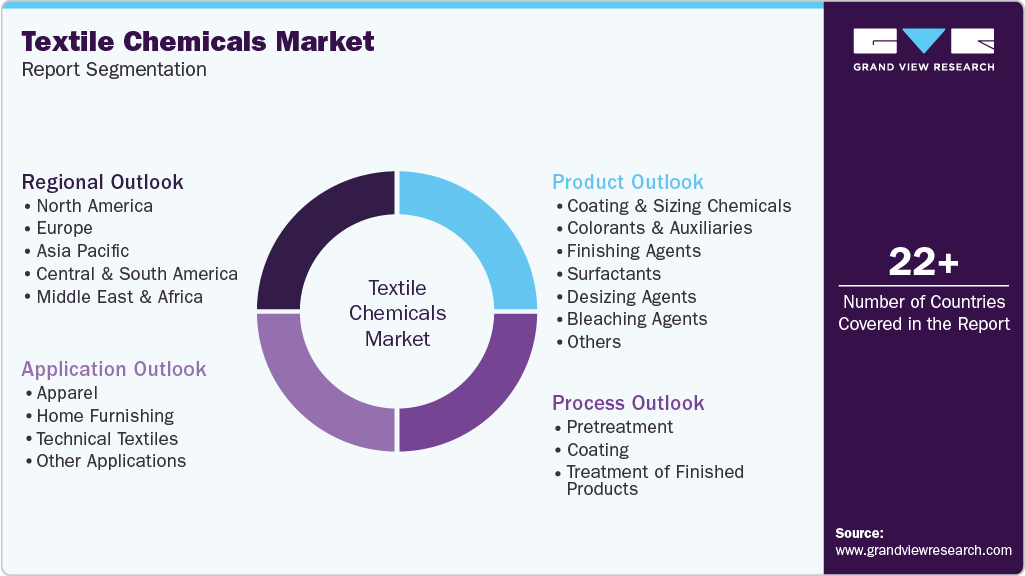
-
Process Outlook (Volume, Kilotons; Revenue, USD Million, 2018 - 2033)
-
Pretreatment
-
Bleaching Agents
-
Desizing Agents
-
Scouring Agents
-
Others
-
-
Coating
-
Anti-Piling
-
Protection
-
Water Proofing
-
Water Repellant
-
Others
-
-
Treatment Of Finished Products
-
Softening
-
Stiffening
-
Others
-
-
-
Product Outlook (Volume, Kilotons; Revenue, USD Million, 2018 - 2033)
-
Coating & Sizing Chemicals
-
Colorants & Auxiliaries
-
Dispersants/levelant
-
Fixative
-
UV absorber
-
Others
-
-
Finishing Agents
-
Flame retardants
-
Antimicrobial or anti-inflammatory
-
Repellent and release
-
Others
-
-
Surfactants
-
Detergents & Dispersing Agents
-
Emulsifying Agents
-
Lubricating Agents
-
Wetting Agents
-
-
Desizing Agents
-
Bleaching Agents
-
Scouring Agents
-
Yarn Lubricants
-
-
Application Outlook (Volume, Kilotons; Revenue, USD Million, 2018 - 2033)
-
Apparel
-
Innerwear
-
Outerwear
-
Sportswear
-
Others
-
-
Home Furnishing
-
Carpet
-
Drapery
-
Furniture
-
Others
-
-
Technical Textiles
-
Agrotech
-
Buildtech
-
Geotech
-
Indutech
-
Medtech
-
Mobiltech
-
Packtech
-
Protech
-
Others
-
-
Other Applications
-
-
Regional Outlook (Volume, Kilotons; Revenue, USD Million, 2018 - 2033)
-
North America
-
U.S.
-
Canada
-
Mexico
-
-
Europe
-
Germany
-
Turkey
-
Italy
-
UK
-
France
-
Russia
-
Spain
-
Poland
-
-
Asia Pacific
-
China
-
India
-
Japan
-
South Korea
-
Vietnam
-
Indonesia
-
-
Central & South America
-
Brazil
-
Argentina
-
-
Middle East and Africa
-
Saudi Arabia
-
South Africa
-
Morocco
-
Tunisia
-
UAE
-
Kenya
-
-
Frequently Asked Questions About This Report
b. The global textile chemicals market size was estimated at USD 27,293.7 million in 2024 and is expected to reach USD 28,621.1 million in 2025.
b. The global textile chemicals market is expected to grow at a compound annual growth rate of 4.4% from 2025 to 2033 to reach USD 40,429.0 million by 2033.
b. Asia Pacific dominated the textile chemicals market with a share of 57.6% in 2024, key textile manufacturing hubs such as China, India, Bangladesh, and Vietnam benefit from low production costs, abundant raw materials, and a large labor pool, making the region a global center for textile and apparel production.
b. Some key players operating in the textile chemicals market include AB Enzymes, Archroma, BASF SE, BioTex Malaysia, Dow, Ethox Chemicals, LLC, Evonik Industries AG, Fibro Chem, LLC, German Chemicals Ltd., Govi N.V., Huntsman International LLC, Kemira Oyj, Kiri Industries Ltd., LANXESS, OMNOVA Solutions Inc., Omya United Chemicals, Organic Dyes and Pigments, Resil Chemicals Pvt. Ltd., Solvay S.A, The Lubrizol Corporation.
b. The demand for textile chemicals is increasing rapidly due to the booming clothing and apparel industry, driven by the rising global population, urbanization, and higher disposable incomes.
Share this report with your colleague or friend.
Need a Tailored Report?
Customize this report to your needs — add regions, segments, or data points, with 20% free customization.

ISO 9001:2015 & 27001:2022 Certified
We are GDPR and CCPA compliant! Your transaction & personal information is safe and secure. For more details, please read our privacy policy.
Trusted market insights - try a free sample
See how our reports are structured and why industry leaders rely on Grand View Research. Get a free sample or ask us to tailor this report to your needs.










